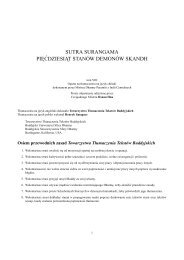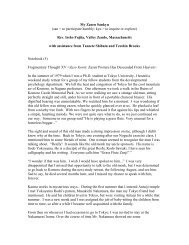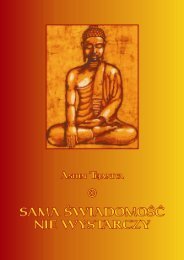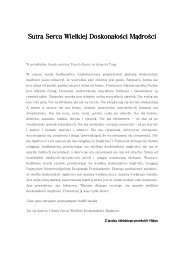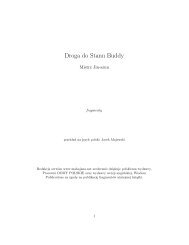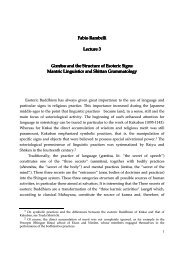Mahamudra Teaching - Dharma Media
Mahamudra Teaching - Dharma Media
Mahamudra Teaching - Dharma Media
Create successful ePaper yourself
Turn your PDF publications into a flip-book with our unique Google optimized e-Paper software.
due to the negative thoughts and actions, and the non-virtues. So see that nature, and realize that as<br />
a beginner we need to tame our mind by ourselves. Don’t just follow along with the bad habits. Tame<br />
your own mind, if anything, because the future, your very next life, depends on this life.<br />
Sustaining Mind, Free from Acceptance and Rejection<br />
Whether we caste our life into the hell realm or into the higher god-like realms, we have the ability to<br />
determine this right in this life’s hand. So look at that nature and remember that “just as I need peace<br />
and happiness in this life, definitely I will need peace and happiness in the next life.” So by knowing<br />
that, by having this wisdom, as a beginner, we have to make effort, we make such a great effort. Then<br />
once we have habitualized or trained in our minds, then in <strong>Mahamudra</strong> practice it is said, “Free from<br />
acceptance and rejections.” Even if a bad thought comes, don’t feel bad about that. Even if a negative<br />
thought comes, don’t feel bad about that. Just let it transcend into <strong>Mahamudra</strong> without aversion.<br />
When good thought comes, don’t attach to that either. Let that be transcended into <strong>Mahamudra</strong>. So<br />
that is called “sustaining the mind, free from rejection and acceptance.” So this all depends on the<br />
individual and how accomplished you are in your meditation practice.<br />
Bringing Suffering and Confusion to the Path<br />
So when we come to this kind of practice and when you are well established in this meditation<br />
practice, then everything can be carried or used as a meditation practice towards enlightenment.<br />
Suffering can also be used as the path towards enlightenment. At that point, suffering is no longer<br />
just suffering. There is a joy. At the beginning suffering and happiness are very concrete. They are<br />
very solid. Because suffering and happiness are a mental perception, once you learn, once you study,<br />
and once you practice, and you keep on doing this, more and more, you see that all phenomena are<br />
just a manifestation of the mind. Then suffering no longer has only the nature of suffering; it has the<br />
nature of joy. Non-virtue is no longer just non-virtue; it can have the nature of virtue. So all these<br />
things that we believe are faults or mistakes can be transformed or can be seen as good qualities.<br />
Therefore that’s called all the “confusion, error dawns as wisdom.”<br />
This is the quality of <strong>Mahamudra</strong>. <strong>Mahamudra</strong> has such a great quality. The nature of everything in<br />
samsara can be seen as possessing the perfect qualities of the Buddha. So to do that first establish<br />
dedication and confidence and then simply put effort into sustaining that through mindfulness.<br />
Mindfulness is the key to carrying all this onto the path.<br />
An All-Inclusive Practice<br />
When we practice <strong>Mahamudra</strong> meditation that contains all the other subjects that we have studied<br />
and have talked about. All are contained therein. When one has this awareness or the primordial<br />
wisdom, which is <strong>Mahamudra</strong>, then right there is the presence of the Buddha, <strong>Dharma</strong>, and Sangha.<br />
The glory of the Buddha, <strong>Dharma</strong>, and Sangha is right there.<br />
When we have <strong>Mahamudra</strong> practice, this is the ultimate Bodhicitta. Right then and there one has<br />
Bodhicitta and all the peace and bliss.<br />
In the Hevajra Tantra it is mentioned, “<strong>Mahamudra</strong> meditation practice contains the recitation of the<br />
mantra.” When we recite or repeat mantra it is in order to transform our ordinary thoughts into the<br />
Buddha’s speech. And when we visualize ourselves as the deity it is in order to purify our ordinary



![Shushogi, Dogen Zenji [PDF] - Mahajana.net](https://img.yumpu.com/50921105/1/190x219/shushogi-dogen-zenji-pdf-mahajananet.jpg?quality=85)

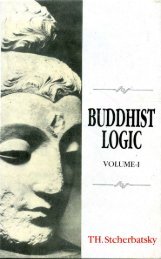
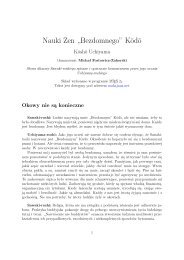
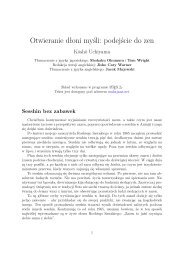
![wywiadu z Murakami Kosho Roshim [PDF] - Buddyzm w Polsce i na ...](https://img.yumpu.com/45809746/1/184x260/wywiadu-z-murakami-kosho-roshim-pdf-buddyzm-w-polsce-i-na-.jpg?quality=85)


